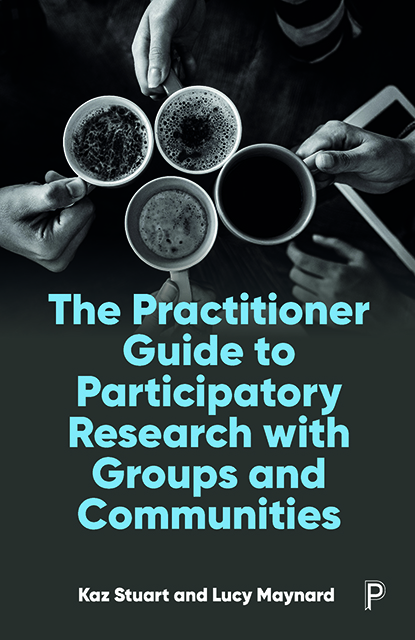Book contents
- Frontmatter
- Contents
- List of Figures and Tables
- Glossary
- About the Authors
- Acknowledgements
- Foreword
- Foreword
- Introduction
- 1 Just What is Participatory Research?
- 2 How do We Begin to Plan Our Participatory Research Project?
- 3 What Do We Want to Explore and Why?
- 4 What Ideas are the Foundations of Our Research?
- 5 How Will We go About Exploring Our Questions?
- 6 Who Can Get Involved to Explore Our Questions?
- 7 How Shall We Collect Our Data?
- 8 What Do We Do With Our Data?
- 9 How Do We Get Our Messages Out There?
- 10 How Do We Keep Everyone Safe?
- 11 Doing and Reviewing Participatory Research
- Conclusion
- References
- Index
6 - Who Can Get Involved to Explore Our Questions?
Published online by Cambridge University Press: 21 June 2023
- Frontmatter
- Contents
- List of Figures and Tables
- Glossary
- About the Authors
- Acknowledgements
- Foreword
- Foreword
- Introduction
- 1 Just What is Participatory Research?
- 2 How do We Begin to Plan Our Participatory Research Project?
- 3 What Do We Want to Explore and Why?
- 4 What Ideas are the Foundations of Our Research?
- 5 How Will We go About Exploring Our Questions?
- 6 Who Can Get Involved to Explore Our Questions?
- 7 How Shall We Collect Our Data?
- 8 What Do We Do With Our Data?
- 9 How Do We Get Our Messages Out There?
- 10 How Do We Keep Everyone Safe?
- 11 Doing and Reviewing Participatory Research
- Conclusion
- References
- Index
Summary
Chapter overview
This chapter will delve a little deeper into who could be involved in participatory research. As we have discussed in previous chapters, there are various starting points for participatory research. Once co-researchers have come together, they then make decisions about who else can be involved, how and in what way. We will discuss people’s involvement in terms of target populations, sampling and recruitment strategies.
Who to involve in research
At the heart of participatory research is the assumption that involving diverse people in research design and delivery will make the world a more socially just place. This is based on the belief that a wider range of views of what knowledge is, how knowledge is built and what needs to be known is beneficial. Considering who could be involved in research is therefore of central importance.
As we have already discussed, the group you work with as co-researchers is usually established in one of these three ways:
1. You go to members of a group or community wanting to do some research with them.
2. Members of a group or community come to you wanting to do some research with you.
3. You decide to do some research together as you are engaged in other activities with the group or community.
Let’s draw from our three case studies straight away in this chapter to exemplify these three starting points:
In group A, participatory researchers sought out a group of students to explore mental health provision in schools.
In group B, a group of parents approached the participatory researchers to support them in exploring their own experiences of police stop and search of their children – the parents were the participants.
Group C, the group of multi-agency practitioners working in community development projects across India, came together on a leadership development training programme and wanted to explore common experiences of engaging their teams in multi-agency working. The leadership development trainers on the programme became the participatory researchers.
It may be that your participatory project has been initiated by a group of people, in which case the co-researchers are already there.
- Type
- Chapter
- Information
- Publisher: Bristol University PressPrint publication year: 2022



